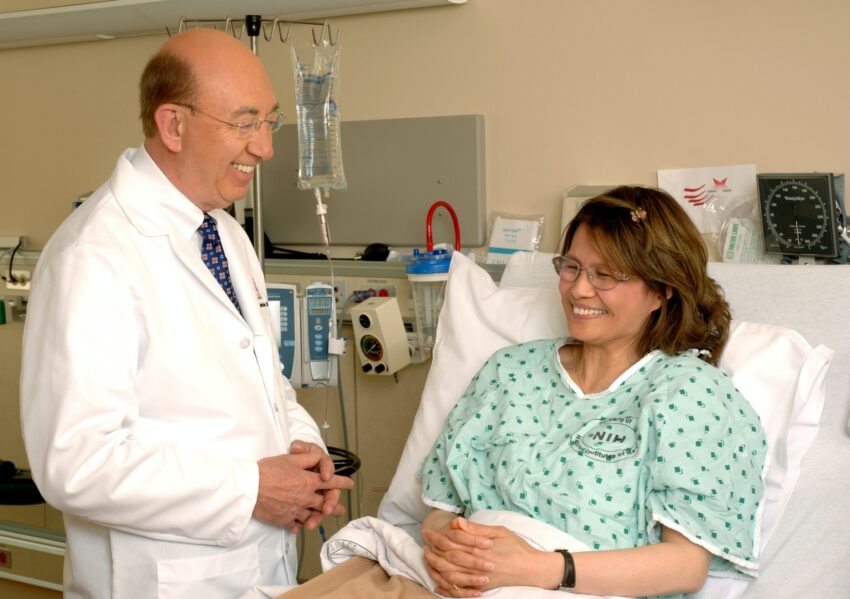Cancer occurs when cells divide uncontrollably, forming a tumor. Oncologists are doctors who treat patients with cancer.
Treatments include chemotherapy (particular drugs that kill cancer cells), radiation therapy (using X-rays or particles to destroy tumors), hormone therapy, bone marrow/stem cell transplant, and clinical trials.
Palliative treatments help relieve side effects from the cancer or the treatment, including pain and fatigue.
What is Oncology?
Cancer disease affects every aspect of a person’s life, and it is no surprise that there is an entire field of medicine dedicated to studying this pervasive illness. It is called Oncology, and it includes medical oncology (chemotherapy, immunotherapy, and hormone therapy), radiation oncology (radiation treatment for cancer), and surgical oncology (surgery to treat cancer).
Cells in our body have a highly regulated system that controls their growth, maturity, and reproduction, but abnormal cells begin to grow out of control and eventually form malignant tumors. These tumors can spread to other body parts through the bloodstream, causing further harm.
Oncologists with the likes of Armen Parajian can diagnose cancer by performing a physical exam, taking a blood or urine sample, and ordering imaging tests like MRIs, CT scans, and ultrasounds. They will also consider a patient’s medical history, family health, and any symptoms they are experiencing. The oncologist will then develop a treatment plan that considers the type of cancer, its location, and other factors such as age and fitness level.
Diagnosis
A physical exam and an analysis of symptoms is usually the first step. X-rays, CT scans, MRI, ultrasound, and other imaging tests help doctors find the location of tumors and other bodily abnormalities. Blood tests can also raise suspicions and provide information about possible cancer-causing substances.
Following an MRI in Iselin, NJ or elsewhere closer to you, your doctor may require a biopsy upon examination of the medical imaging results. A biopsy involves collecting a small sample of cells for cancer testing. These samples are then examined under a microscope. Normal cells look uniform and organized; cancerous cells have a chaotic appearance.
Genetic testing can also be helpful, as some types of cancers are more likely to occur when a person has specific genetic mutations. These results can give doctors clues about how a patient might respond to different treatments.
Once a diagnosis is confirmed, doctors may do more tests to find out how far the cancer has spread and what type it is. They will also decide on a treatment plan based on the stage of the cancer (whether it has just started or applied to other areas of the body).
Local treatments are those that treat the area where the tumor is located, such as surgery and radiation therapy. Systemic treatments include chemotherapy, which kills cancer cells throughout the body; hormone therapy, which limits the amount of hormones that encourage cancer to grow; and immunotherapy, which helps your immune system fight the cancer.
Treatment
A diagnosis of cancer brings with it many questions and decisions. The more you know about today’s treatment options, the easier it is to make choices that fit your situation and lifestyle.
Surgery:
In some cases, doctors can cure cancer by surgically removing the tumor or the area around it. They also may remove lymph nodes in the area that can contain microscopic cancer cells.
Chemotherapy:
In chemotherapy, particular medicines shrink or kill fast-growing cancer cells that we can’t see. But these medicines can also damage healthy cells that grow and divide quickly, causing side effects such as hair loss, nausea, mouth sores, changes in appetite, and fatigue.
Some types of chemotherapy are given by vein (IV), others are provided through a tube into your intestines, bladder, or belly (intra-arterial, intraperitoneal, and hyperthermic intraperitoneal chemotherapy), or via a pump placed under the skin (port). Hormone therapy:
Prevention
Cancer is a complex disease, but healthy lifestyle choices can prevent most types. These include keeping an average weight, not smoking, and drinking only in moderation. They also include exercising regularly, taking the HPV vaccine, and avoiding sun exposure. Taking these straightforward actions can result in a significant change.
Medical oncologists use surgery, chemotherapy, and other cancer-fighting drugs to cure cancer. After surgery, radiation therapy may be used to destroy any remaining cancer cells by using X-rays or particles to kill cancer cells and prevent them from growing and spreading.
It can be given as an external beam, or it can travel inside your body using radioactive seeds placed near the tumor or through a catheter that goes into a vein (intravenous or IV) or a port in the chest.
Chemotherapy is a medical treatment that involves the use of powerful drugs to fight cancer cells and prevent them from spreading and multiplying throughout the body. It can be given as a pill that you swallow, or it can go into an artery or vein through a thin tube called a catheter or through a port in your chest. You usually get it for three weeks and then have a break to let your body recover from the side effects.

